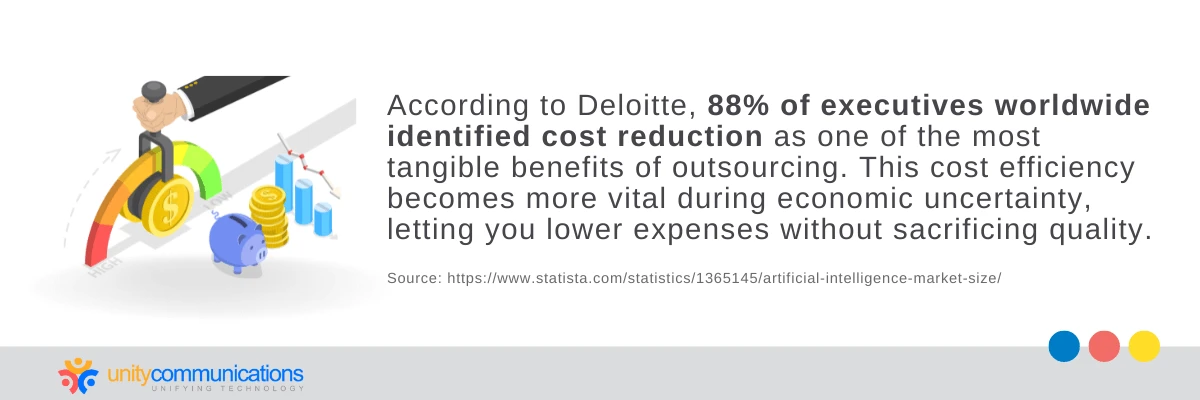Table of Contents
Companies take critical steps to keep afloat amid multiple curveballs thrown at the business arena. Be it a global pandemic, a natural calamity, or an economic downturn, they implement cost-effective ways to mitigate the negative impacts of such disruptions.
Organizations adopt business process outsourcing (BPO) as part of their recovery strategies. This article explores why and how BPO is essential to crisis management and continuity.
Why BPO Is Crucial to Business Continuity

You might wonder: What is the BPO provider’s primary contribution to your business continuity plan (BCP)? Third-party support vendors are experts at adapting to changing circumstances. They train scalable workers capable of handling multiple tasks while producing excellent outcomes. They also supply the technology required to weather any disaster.
BPO companies can quickly deploy professionals and configure their systems to meet fluctuating client requirements in times of crisis. They also use artificial intelligence (AI) and automation solutions to maintain business operations during local or global emergencies.
For instance, service providers optimize chatbots to deliver quick, automated responses to common inquiries. If you outsource your customer service and experience a local blackout due to a super typhoon, your online shoppers will continue receiving real-time support via AI-powered systems.
Entrusting your non-core tasks to service providers is more affordable than managing them in-house. According to Deloitte, 88% of executives worldwide identified cost reduction as one of the most tangible benefits of outsourcing. This cost efficiency becomes more vital during economic uncertainty, letting you lower expenses without sacrificing quality.
Four Ways BPO Assists in Crisis Management and Continuity

Outsourcing provides access to flexible resources essential to mitigating various business risks. As discussed, the practice lets you reduce operating costs while maintaining superior outcomes. Below, we discuss BPO’s contribution to your company’s disaster recovery plan.
1. Provide Remote Workers
Service providers supply a team of remote professionals based on your needs. They implement flexible work arrangements, allowing workers to perform their jobs at home or in the office.
Moreover, BPO companies provide the necessary equipment to ensure remote workers perform their tasks smoothly, wherever they are. Their technology infrastructure includes cloud-based collaboration tools, omnichannel communication systems, and task management portals.
Support vendors and their remote teams also operate based on your business hours and time zones. For example, if you hire call center agents from the Philippines, they work at night to accommodate your American customers reaching out during the daytime.
But how can BPO call centers help your business during natural disasters and other challenges? Here are situations where BPO agents assist in crisis management and continuity:
- Providing appointment scheduling and telehealth support during health crises such as pandemics and flu seasons
- Continuing customer service operations despite a hurricane, earthquake, or wildfire in your physical location
- Conducting investigations and mitigation efforts when your company experiences data breaches or cyberattacks
- Performing telemarketing, lead generation, and financial services during economic downturns
- Utilizing AI-powered solutions to ensure streamlined supply chain processes amid geopolitical issues or trade disputes
- Executing moderation and resolution measures during a social media backlash or negative media coverage
- Accessing desktop systems remotely to troubleshoot and restore malfunctioning information technology (IT) systems
- Delivering customer support during peak sales events, such as holiday rush or online flash sales
2. Deliver Secure Cloud Services
Acquiring cloud services from BPO companies assures that your relevant data is safe despite system failures. Service providers prioritize information security to maintain their clients’ trust and strengthen their industry reputation.
They also want to avoid wasting millions of dollars due to cyberattacks. As IBM reported, the global average data breach cost was $4.45 million in 2023. The technology company warned that 82% of such incidents involved cloud-based data.
BPO companies implement the listed crisis management and continuity measures to avoid data loss during interruptions:
- Execute data redundancy strategies. Service providers keep data on multiple cloud storage platforms. For instance, you integrate your customer relationship management (CRM) system with a provider’s contact center software. Both parties have separate data copies, but the vendor uses another cloud system to store duplicates and backups.
- Automate data syncing with cloud backup solutions. BPO companies ensure critical data is automatically backed up to secure cloud storage whenever employees process it. They can easily retrieve and provide clients with access regardless of location or unexpected technical issues.
- Set up cloud systems for high availability. Support vendors use failover mechanisms to minimize downtime and data loss. These tools automatically redirect traffic and services to alternative cloud servers or data centers when they detect a failure.
- Carry out load-balancing techniques. These strategies distribute network traffic across multiple servers or resources to prevent overloading a single server. This redundancy ensures that even if one server fails, others can continue to handle the workload, maintaining data accessibility.
- Encrypt confidential information. Data encryption is a fundamental security measure in every BPO company’s crisis management and continuity arsenal. BPO cloud services employ this solution to protect data during transmission and storage. The data remains unreadable without the proper decryption keys, even in the case of system failures.
- Use access controls. Third-party vendors enable multi-factor authentication to ensure that only authorized individuals can access your sensitive enterprise data in the cloud.
- Incorporate intrusion detection and prevention into cloud services. This capability helps BPO providers monitor network traffic for any suspicious activity. It quickly identifies and mitigates cyberattacks that cause a system shutdown.
- Perform patch management efforts. Support vendors regularly update their cloud software with the latest security fixes. Doing so resolves bugs and minimizes system vulnerabilities that could lead to system failures.
- Monitor system performance and security continuously. BPO cloud providers make the most of AI-powered tools that automatically look for and track signs of possible system problems. This lets them step in before they happen.
- Establish emergency response teams. As part of safety measures in the cloud, BPO companies have dedicated personnel trained to respond to system failures promptly. Their expertise helps effectively avoid data exposure and downtime.
- Ensure regulatory compliance. Cloud vendors adhere to data protection and privacy laws. They perform regular risk assessments, audits, and system-tracking activities. This BPO crisis management and continuity approach helps prevent the high cost of delays and fines due to malfunctions and breaches.
3. Offer Self-service Options
BPO vendors use AI and robotic process automation (RPA) to enable self-service options anytime. These capabilities ensure customers can access your products and services quickly, especially during emergencies.
According to recent research, 89% of customers will continue buying from a company that lets them find answers to their concerns online without contacting human agents. Profitability aside, the self-service capability also helps maintain business continuity amid challenging times.
This BPO offering is available around the clock, allowing access to critical information and support whenever needed. Suppose you outsource your IT team. The provider’s automated ticketing app lets your employees, who temporarily work from home, report laptop and network errors even when a storm hits their hometown.
Furthermore, self-service tools serve as a primary communication channel during a crisis. These solutions include chatbots and tools that provide automated email replies and social media responses. You can work with your provider to configure them to disseminate important incident updates and safety protocols.
Most importantly, support vendors deliver self-service portals that aggregate data from various sources. Such platforms provide a centralized hub where workers and customers can access relevant crisis-related materials, guidelines, and contacts.
4. Help Develop BCPs
Working with BPO companies allows you to develop effective crisis management and continuity plans. Since the pandemic hit a few years ago, many organizations have transitioned to more agile work environments and better collaborative practices.
Businesses tap into outsourcing to draft and implement disaster recovery strategies as part of such efforts. Service providers assist them through the following actions:
- Conduct a comprehensive risk assessment. Third-party vendors evaluate your systems and operational techniques to identify potential threats. Discovering these vulnerabilities helps determine areas for improvement to avoid disruptions.
- Perform a business impact analysis (BIA). While conducting risk assessments, support providers weigh the impact of various crises on your key processes. This analysis helps prioritize which functions require specific attention in your BCP.
- Create scenarios for different types of emergencies. They prepare you to respond effectively to various situations, from natural disasters to cybersecurity incidents.
- Enumerate critical resources. BPO companies assist in listing the personnel, technology, and infrastructure necessary to execute your BCP successfully. Part of this is establishing the core communication platform for prompt and accurate data dissemination during crises.
- Support training and awareness programs for client employees. This step ensures your team members understand their roles in crisis management and are well-prepared to carry out your BCP.
- Test and simulate the BCP’s effectiveness regularly. These exercises include tabletop exercises, drills, and full-scale simulations. You and your provider can learn which areas to enhance and how to update the plan’s clauses. Considering lessons learned from the previous and latest happenings also helps improve the BCP.
- Help ensure the BCP’s regulatory compliance. BPO providers prepare and handle your legal requirements to ensure your crisis management and continuity plan adhere to relevant industry regulations.
- Monitor and assess the provider’s risk management plans. You can require or join the evaluation of your BPO partner’s disaster recovery strategies. This ensures their methods match yours. It also assures you that they can continue providing services even during disruptions.
- Establish clear coordination and feedback mechanisms. Service providers specify escalation paths and reporting procedures to ensure both parties know how to react in real time during a crisis.
The Bottom Line

BPO experts and modern technologies assist in boosting your crisis management and continuity efforts. Remote work lets providers handle your front- and back-office functions. This feature is critical when natural calamities or social issues interrupt your in-person operations.
Before you maximize outsourcing’s benefits, you need to know how a provider supports you in implementing an effective business recovery and backup plan. The enumerated methods help you align your strategies with your BPO partner, avoiding the high cost of delays and errors caused by unexpected disruptions.
Do you want to learn more about how a BPO provider supports your incident mitigation efforts? Let’s connect and work together to address potential risks to your growing enterprise.




